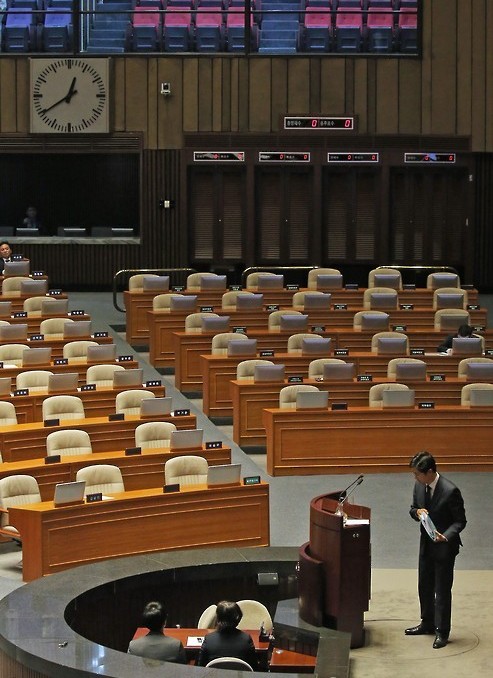- California Assembly OKs highest minimum wage in nation
- S. Korea unveils first graphic cigarette warnings
- US joins with South Korea, Japan in bid to deter North Korea
- LPGA golfer Chun In-gee finally back in action
- S. Korea won’t be top seed in final World Cup qualification round
- US men’s soccer misses 2nd straight Olympics
- US back on track in qualifying with 4-0 win over Guatemala
- High-intensity workout injuries spawn cottage industry
- CDC expands range of Zika mosquitoes into parts of Northeast
- Who knew? ‘The Walking Dead’ is helping families connect
Anti-terrorism bill fails to pass after filibuster in South Korea

Rep. Kim Kwang-jin of the main opposition Minjoo Party of Korea leaves the floor of the National Assembly on Feb. 24, 2016, after a speech that stretched out for five hours and 32 minutes to filibuster an anti-terrorism bill. The party is trying to block the bill, introduced in 2001 following the Sept. 11 attacks, that it sees as giving intelligence authorities too much power and enabling abuse. The party said its legislators will take turns throughout this week making speeches to continue the filibuster. (Yonhap)
SEOUL (Yonhap) — A long-stalled anti-terrorism bill failed to pass through a parliamentary session late Tuesday due to the main opposition party’s marathon filibuster.
Rep. Kim Kwang-jin of the main opposition Minjoo Party of Korea took the floor to speak at length against the bill that was taken by an assembly speaker to the floor for a vote.
It marks the first time a Korean-style filibuster rule was applied since its adoption in 2012. The rule allows a lawmaker to speak endlessly in order to delay a bill.
Earlier, National Assembly Speaker Chung Ui-hwa invoked his authority to take the bill to the floor for a vote that has been stalled for more than a decade.
Since the first draft was filed with the National Assembly following the Sept. 11 attacks in 2001 to effectively fight against terrorism, no major progress has been made.
The bill was scrapped every time during previous parliaments due to concern about giving more authority to the National Intelligence Service (NIS), South Korea’s top spy agency, and its possible abuse of power.
Under the bill, an anti-terrorism center will be set up under the Prime Minister’s Office, but the NIS will have the power to gather the relevant information on possible terrorists and attacks.
The Saenuri Party argues that the NIS should collect and use the information as the agency has expertise, while the Minjoo Party expressed concerns over illegal surveillance of ordinary citizens.
The bill has gained new momentum following North Korea’s nuclear test and long-range rocket launch in recent weeks.
President Park Geun-hye has worried possible terror attacks, urging bipartisan cooperation for the endorsement of the bill meant to better protect the lives of South Koreans.
The Minjoo Party said its lawmakers will take turns delivering five-hour speeches on average so that this filibuster continues at least to Friday.
The party controls 108 seats in the 293-member National Assembly.
















L
February 24, 2016 at 3:32 PM
Civil Freedom Limitation Law (AKA Anti-Terrorist law) should not get registered in South Korea
“Man have right to thrive in freedom of speech.
They must be free from any oppression.
What is most important is that
one should be able to choose
one’s own destiny”
-Eun Su Mi
Eun Su Mi is a politician who was jailed/tortured for six years as a college student when Korea was under military dictatorship.
She had to go through multiple surgery after the torture. That was 20 years ago and yet she is still suffering from them. And yet she went through 10 hours of filibuster to postpone registration of this law.
The law she is trying to prevent will be firststep towards limiting Civil Freedom to the rate of the times of the military dictatorship. The law will allow NIS to be able to investigate anyone and anything they presume to be suspicious of terrorist/anti government activity.
While the law states it was made to prevent terrorism, one must not forget the Korean military dictatorship got away with torturing and executing people under mere assumption that they might be communists- and the current president is the daughter of the very dictator of that military regime and is not apologetic about her father’s actions.
Even if the government states it will make another division under government to verify NIS has understandable reason to investigate specific personnel, it is hard to rely on the government which is run by the president whose election was specifically assisted by NIS(a division of NIS has participated anonymously with promoting then president candidate Park Geun Hye via SNS.)- to make any objective decision apart from NIS.
Right now following Eun Su Mi, supporting politicians are following up with efforts to postpone the law registration. While it will hopefully succeed with preventing initial registration, it is not clear if it will succeed with preventing registration after all. At this point what is more important is that the government recognizes what they are risking when they pass this law. They must know the eyes watching them are not just ignorant dismissables but people with actual power to overthrow them.
Please help the world know what the Koreans are now faced with. Koreans need genuine determination to preserver through upcoming years- and it will be very harsh years..